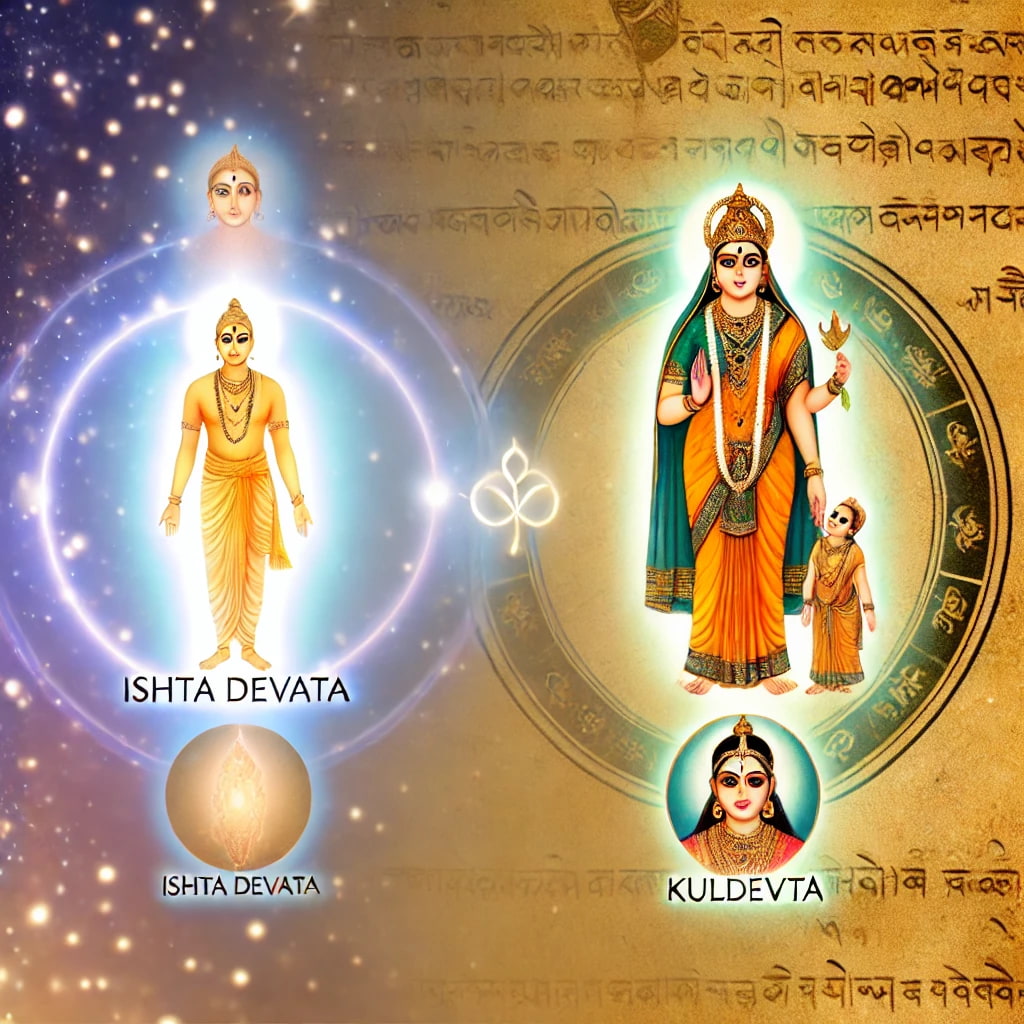Differences Between Ishta Devata and Kuldevta – What You Need to Know
Aryan K | August 16, 2024

In the vast tapestry of Hindu spirituality, the concepts of Ishta Devata and Kuldevta weave a profound narrative, connecting individuals to the divine in unique ways. But what do these terms really mean, and how do they differ? Let’s dive deep into this mystical realm to unravel the mystery, exploring the essential difference between Ishta Devta and the Kul Devata.
Ishta Devata: Your Personal Divine Guide
Ishta Devata—literally translating to “Chosen Deity”—is your personal guardian on the spiritual path. The ishta devata isn’t just any deity; it’s the one you feel most connected to, the one who speaks to your soul in ways that others don’t. Some find their Ishta Devata through deep personal reflection, feeling an inexplicable pull towards a particular god or goddess. Others might discover theirs through the intricate calculations of Vedic astrology, where the stars and planets reveal the deity destined to guide you.
Your Ishta Devata is more than just a figure of worship. They are your spiritual confidant, the one you turn to in times of need, seeking wisdom and solace. The bond with this deity is intensely personal, often forged through rituals, prayers, and meditation that feel almost like a conversation with an old, trusted friend. This deity, you believe, helps you navigate the labyrinth of life, leading you closer to spiritual fulfillment and, ultimately, liberation.
Kuldevta: The Ancestral Protector
On the other hand, the Kuldevta, or family deity, is a guardian passed down through generations. This isn’t a deity you choose; rather, it’s one that has chosen your family, offering protection and blessings to each member, past, present, and future. The Kuldevta is revered through age-old rituals and traditions, often specific to your family’s lineage, and is a vital link for the family between you and your ancestors.
Worshiping the Kuldevta isn’t just a religious practice; it’s a way of honoring your heritage and keeping alive the sacred traditions that have shaped your family’s spiritual identity. This is the significance of the Kuldevta as a family deity, providing protection and guidance to the lineage. The Kuldevta watches over the entire family, ensuring its prosperity, well-being, and continuity. It’s a shared faith, a collective reverence that binds the family together, transcending time and connecting generations in a chain of devotion.
Key Differences: The Difference Between Ishta Devata and Kuldevta
Now, let’s explore the differences. On the surface, Ishta Devata and Kuldevta might seem similar—they both connect you to the divine, after all—but they serve distinctly different purposes. Understanding the difference between Ishta Devta and Kul Devata is key to deepening your spiritual connection. It is important to note that Ishta Devata is a personal deity, while Kuldevta is a family deity.
Personal vs. Ancestral: Ishta Devata is deeply personal, chosen by the individual, while Kuldevta is ancestral, tied to your family lineage. Your connection with your Ishta Devata is a singular experience, whereas your relationship with the Kuldevta is a shared family tradition.
Choice vs. Inheritance: Choosing your Ishta Devata can be an introspective journey or one guided by astrology, but your Kuldevta is to be inherited, a divine legacy passed down through the ages.
Guidance vs. Protection: Your Ishta Devata is there to guide you on your personal spiritual journey, offering wisdom and support. The Kuldevta, however, is the protector of the entire family, ensuring the collective well-being of all its members.
Discovering Your Ishta Devata and Kuldevta
So, how do you find out who these deities are? If you ask your elders, they’ll tell you about the deity who has watched over your lineage for generations, emphasizing the importance of respecting and honoring your Kuldevta. For your Ishta Devata, you can identify the deity that resonates with your soul by introspection or consulting a Vedic astrologer.
Conclusion: Connect with Your Divine Guides
Understanding the difference between Ishta Devta and Kul Devata not only enriches your spiritual practice but also deepens your connection to both the divine and your heritage. These deities, each with their unique roles, offer guidance and protection, helping you navigate life’s spiritual journey.
And if you’re eager to discover your Ishta Devata, Deluxe Astrology offers a free Ishta Devata Calculator online. This tool helps you identify your personal deity, based on the celestial patterns present at your birth. Begin your spiritual journey today with the guidance of your chosen deity.
Recent Posts

What Does the Bear Spirit Animal Mean for You?
Aryan K | March 31, 2025

Dream Meanings and Astrology: Unlocking the Secrets of Your Dreams
Aryan K | March 31, 2025

What Makes a September 14 Virgo? Discover Their Unique Traits
Aryan K | March 31, 2025

Spirit Animal Spider Meaning: A Guide to Its Interpretation
Olivia Marie Rose | March 31, 2025

Understanding Virgo in Astrology: Traits, Compatibility, and More
Olivia Marie Rose | March 30, 2025
Topics
- 4 Digit Angel Numbers
- 5 Digit Angel Numbers
- 6 Digit Angel Numbers
- Astrology and Birth Charts
- Business Astrology
- Career Astrology
- Celebrities and Personalities Astrological Profile
- Children Astrology
- Chinese Astrology
- Different Angel Numbers Meaning
- Double Digit Angel Numbers
- Dreams Interpretation
- Festivals
- Finance Astrology
- Find Baby Names
- Find Best Astrologers
- Gemstones and Birthstones
- Janam Kundli Chart
- Love Astrology
- Marriage Prediction Astrology
- Nakshatra (Constellations)
- Numerology
- Pet Astrology
- Rudraksha Beads
- Single Digit Angel Numbers
- Spirit Animals
- Spirituality and Positivity
- Stars, Planets and Cosmic
- Symbolism
- Tarot Cards
- Triple Digit Angel Numbers
- Understanding Hinduism
- Vastu Shastra
- Vedic Astrology
- Western Astrology
- Yoga and Meditation
- Zodiac Sign Date Calendar
- Zodiac Signs
- Zodiac Signs Compatibility
